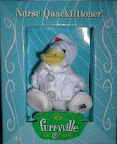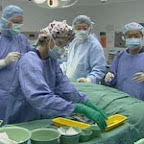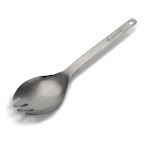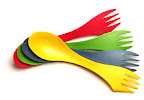 I don't know what to say. While surfing, I noticed Kim from Emergiblog's support for the concept of a US National Nurse via a US Congress Bill HR903. I can only presume this is a nursing equivalent of the US Surgeon-General.
I don't know what to say. While surfing, I noticed Kim from Emergiblog's support for the concept of a US National Nurse via a US Congress Bill HR903. I can only presume this is a nursing equivalent of the US Surgeon-General.Now, I had always thought it a bit odd that the US had a Surgeon-General, but fair enough, that's what they decided on. His or her job is to go around promoting public health. That's great. In fact, the Surgeon-General's specific duties are:
- To administer the U.S. Public Health Service (PHS) Commissioned Corps, which is a uniquely expert, diverse, flexible, and committed career force of public health professionals who can respond to both current and long-term health needs of the Nation;
- To provide leadership and management oversight for PHS Commissioned Corps involvement in Departmental emergency preparedness and response activities;
- To protect and advance the health of the Nation through educating the public; advocating for effective disease prevention and health promotion programs and activities; and, provide a highly recognized symbol of national commitment to protecting and improving the public's health;
- To articulate scientifically based health policy analysis and advice to the President and the Secretary of Health and Human Services (HHS) on the full range of critical public health, medical, and health system issues facing the Nation;
- To provide leadership in promoting special Departmental health initiatives, e.g., tobacco and HIV prevention efforts, with other governmental and non-governmental entities, both domestically and internationally;
- To elevate the quality of public health practice in the professional disciplines through the advancement of appropriate standards and research priorities; and
- To fulfill statutory and customary Departmental representational functions on a wide variety of Federal boards and governing bodies of non-Federal health organizations, including the Board of Regents of the Uniformed Services University of the Health Sciences, the National Library of Medicine, the Armed Forces Institute of Pathology, the Association of Military Surgeons of the United States, and the American Medical Association.
- carry out activities to encourage individuals to enter the nursing profession, including providing education on the distinct role of nurses in the health professions and examining nursing issues that would increase public safety, such as issues relating to staff levels, working conditions, and patient input;
- carry out activities to encourage nurses to become educators in schools of nursing;
- carry out activities to promote the public health, including encouraging nurses to be volunteers to projects that educate the public on achieving better health; and
- conduct media campaigns and make personal appearances for purposes of paragraphs (1) through (3).
 The Surgeon-General does not go out promoting the role of doctors (or even surgeons). He promotes public health by overseeing the US Public Health Service Commissioned Corps. That team consists of doctors, nurses and other allied health professionals. Is it not enough that nurses are part of a team? If they want to run the team why doesn't a nurse nominate themselves for the office of Surgeon-General? It's pretty clear that you don't even have to be a surgeon.
The Surgeon-General does not go out promoting the role of doctors (or even surgeons). He promotes public health by overseeing the US Public Health Service Commissioned Corps. That team consists of doctors, nurses and other allied health professionals. Is it not enough that nurses are part of a team? If they want to run the team why doesn't a nurse nominate themselves for the office of Surgeon-General? It's pretty clear that you don't even have to be a surgeon.I don't know about you, but I am not in support of this concept. If a nurse wants to come and show that she can lead a team of health professionals then feel free. This is not a bill for a public-health advocate, or even a patient advocate. This is a bill for an Office of the Nurse-Advocate.









